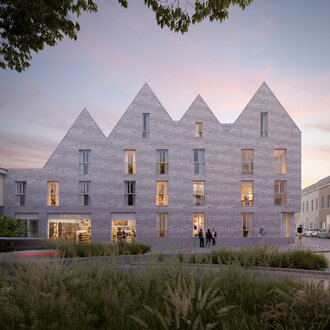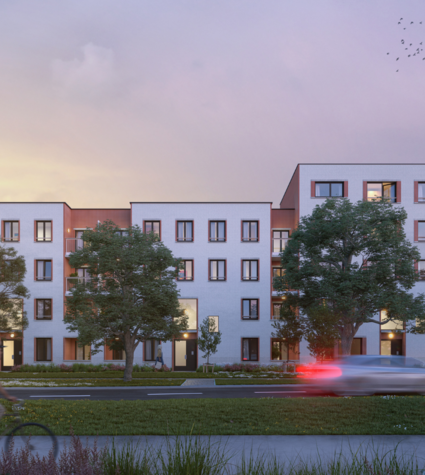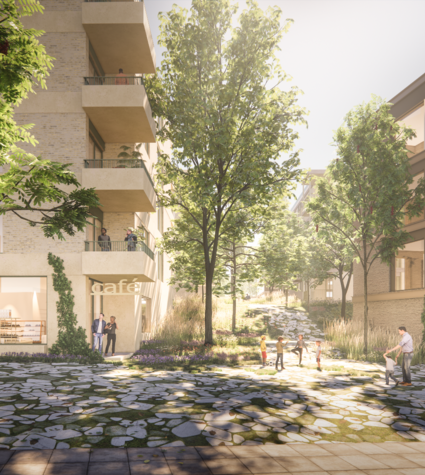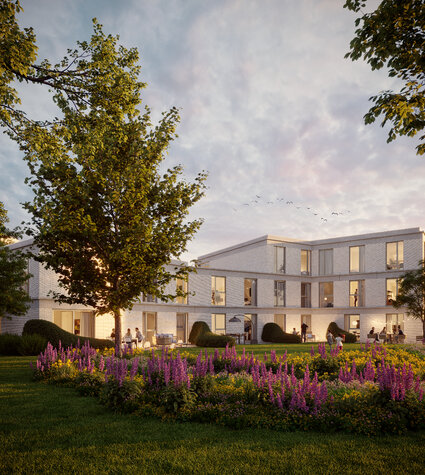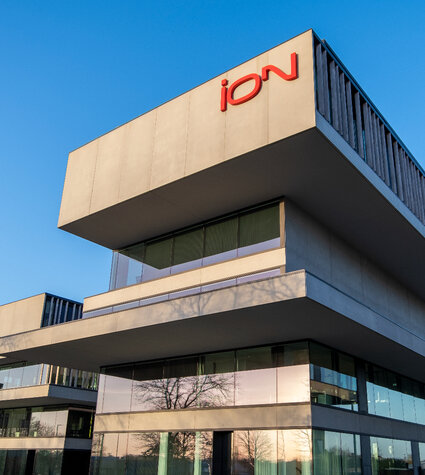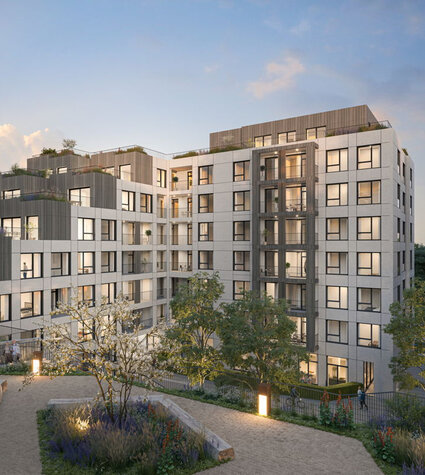
The residential real-estate market for institutional investors

Jasper, could you briefly introduce Bouwinvest?
Jasper, you're calling in from the Netherlands. Unfortunately, we were unable to welcome you live in the studio, but we can hear you well. Can you hear us well too?
Jasper: Absolutely! I'm sorry I couldn’t join you in Brussels.
No problem, it worked out this way.
Jasper: Yes, I would love to! Bouwinvest is an international real-estate investor. We are originally from the Netherlands, but nowadays we also have offices in New York and Sydney. We are a major investor in the Netherlands, but also across Europe, in America and Asia. We try to create value sustainably in order to contribute to more liveable and inclusive cities. Our investors are mainly pension funds and insurers who are in it for the long haul and are also focused on long-term collaborations.
Line, perhaps you could also explain what CBRE stands for.
Line: Certainly. Most of our audience is probably already familiar with CBRE. It is one of, if not the largest real-estate company in the world. We offer a whole range of services such as regular real-estate sales, brokerage, valuations, and so on. Within CBRE we have CBRE Global Investors, which is the Investment Management Business of CBRE that also invests money for institutional investors like pension funds, insurance companies and so on from all over the world. Within CBRE Global Investors there is another slightly smaller group called Global Investment Partners. That's where I work. We always invest indirectly in real estate through real-estate funds, joint ventures, club deals, co-investments and so on. This is also the part of the company investing in this joint venture.
In Europe, we have about 10 million euros worth of real estate and about 4 billion euros of residential projects. We know the market well and we are now taking our first steps in Belgium.
Welcome also to Sam. You are the manager of the ION Residential Platform, in which the three speakers who are here today are all partners. Maybe you could briefly explain what it is exactly.
Sam: Yes, that's right. With the ION Residential Platform, our intention is to make long-term investments in the residential rental market. ION was already active in the development of real-estate projects, also primarily residential, with a view to selling them to private individuals. Today, we are very happy that together with Bouwinvest and CBRE, we have also become active as investors, which enables us to make long-term investments in a market we strongly believe in.
It is the first institutional residential real-estate platform here in Belgium. Why is it being launched now?

First of all, it is important to know that the residential property market in Belgium has historically always been a buyers' market. The vast majority of residential property is in the hands of private individuals, be it the owner-occupants or private investors who own one, two or multiple flats to rent out. This is a very different situation from what we see in many other European countries, where there are large owners who own thousands of flats, manage them professionally and rent them out on a long-term basis. For a long time, there was talk of this trend coming to Belgium too. It took a while, but we strongly believe that the stars are now aligned for this trend to break through in Belgium as well.
We see several key drivers for this. Firstly, the number of tenants in Belgium is rising. This is linked to what was just said in the introduction: real-estate prices are rising rapidly. This was the case last year, but it has actually been a trend for 10 to 20 years. It has made it more difficult for a large part of the population to buy their own homes. We are seeing that it is becoming difficult, especially for young people, to save up enough money to buy a house. They therefore postpone this purchase until later in life.
We also see that the lifestyle of young people is changing. Someone who graduates today at the age of 22, so to speak, no longer necessarily wants to live at home for three more years and save as much as possible, only to buy a house at 25 where they will spend the rest of their lives. No, young people may want to start their career in Brussels and after a year gain experience abroad, searching in another house. This younger target group is therefore particularly dependent on the rental market.
Secondly, we are seeing an increase in supply from property developers who traditionally chose to sell their residential developments per unit. A block of 100 units was normally sold to 100 different buyers as this enabled them to make the most profit. Now we are seeing increasing interest from developers to sell entire blocks. This means that instead of selling 100 units to 100 buyers, they are sold all at once to one final investor, and we are one of those today.
This has a number of important advantages for the developer. Firstly, the commercialisation risk of the project is completely eliminated in one go. This can also result in the developer being able to obtain better financing conditions from banks. Banks have become much more cautious in financing development projects during the COVID crisis, which means that a block sale can now become an interesting option for developers and it is also actively considered by various parties on the market. These developers are now weighing up the question, “Am I satisfied with a slightly lower margin if my risk is completely eliminated?” Today, this question is being asked more actively and block sales are more often being considered as the better option.
Allow me to turn to Jasper for a moment. You joined this initiative. Why?
Jasper: At Bouwinvest, we are very familiar with investing in residential property. We are one of the largest residential investors in the Netherlands, where we also have a portfolio of almost seven billion euros. We are also present in other countries in Europe, and elsewhere in the world.
Residential properties contribute very well to Bouwinvest's goal of providing 'real value for life' – simply put, contributing to more liveable and inclusive cities. In Belgium the market for institutional investors is still in its infancy, as Sam also mentioned. We see an opportunity there to share our knowledge and assets to help that market mature a bit. Ultimately, we can create beautiful homes for the tenants who are looking for them. For us, this turned out to be a great opportunity. Belgium is also a new market for us. From what we’re seeing and given ION’s experience and our partnership with CBRE, we are very confident we will succeed.
I can see Line smiling. Are you equally confident about the platform?
Line: I think that, just like Bouwinvest, we already have a lot of exposure in other countries in Europe and also globally. What makes Belgium interesting and what attracts us more specifically is that the rental market is not new here. Many people have been renting property for a long time in the country, especially in the largest cities such as Brussels and Antwerp, where 60% of the residents are tenants. This rental market is very fragmented and owned by private investors. This poses a great opportunity because we can take a big step towards making the market more professional. People who rent a property here also see that better quality is offered in other countries, perhaps through larger communal spaces, more personal contacts, more value… There may be someone who immediately comes to fix your boiler when it is broken, someone you can have a good conversation with… We definitely see an opportunity to offer better, more qualitative and affordable housing that is managed in a professional way.
So this will definitely also benefit the tenant?
Line: We are convinced of that!
The platform wants to make some acquisitions in the coming months. Can you tell us anything about that?
Sam: As Line also indicated, we are looking for investments in the large cities such as Brussels, Antwerp, Ghent and Liège. Cities where there is a great need for affordable rental properties. We also believe that these cities will continue to attract people in the future. Within these cities, we do not necessarily focus on a single location. A project could be either centrally located or slightly more on the outskirts of the city. Considering, of course, that affordability is very important to us, we are often reluctant to launch a project near the city’s main square and we deliberately move a bit more towards the outskirts. Nevertheless, we continue to settle in locations that offer good amenities nearby and are well-connected.
We are already considering various opportunities and we intend to make a number of investments in the short term. Typically, we are looking at projects between 50 and 150 units, depending on the location.
These include newbuild projects, so development projects both by ION and other developers, but we are also actively looking at existing real estate, existing portfolios or properties that we could acquire today.
Yes, Jasper, let's talk about sustainable property development, which is also an important objective of the platform. I think that sometimes the Netherlands are a bit more advanced in that area. Do you agree?
Jasper: It's certainly true that in the Netherlands a lot of attention is paid to sustainability. We try to pursue the Paris targets all over the world as well.
For us at Bouwinvest, that is a very important aspect when investing. We try not only to reach our Paris targets, we also believe that if you build sustainably and create cities where people can live comfortably and affordably, this also benefits the return in the long term. Our investors, certainly pension funds and insurers, also consider sustainability very important because they are at the heart of society. They invest for people who are also part of that society. We try to make this one of the core objectives wherever we invest.
As Line explained earlier, there are many people who rent out one house or one flat. These individuals will struggle more to invest in sustainability than investors who own an entire block. That is where we, as institutional investors, come in.
Yes, I see the possibilities. We already talked about young people who don’t want to settle down and buy a house straight away, unlike our parents. Line, what is your target audience?
Line: I think our target audience is very broad. In principle, we do not want to exclude anyone. Everyone can rent an IRP property. As already mentioned, we focus very much on the affordability of the property so we try not to be in the premium segment but rather to appeal to the middle market segment. We expect our tenants to primarily be young people, as Sam said, who will no longer save up as much as possible, as quickly as possible to buy a home. They will rent in a good location that is easily accessible, that allows them flexibility and where they get a good product at an affordable price. Examples include families with young children, but also older people whose children have just moved out. The latter group tend to own a house in a smaller village or in the countryside that they want to sell in order to move back to those cities, which are more easily accessible so that they only have to go out for groceries.
So I think as broadly as possible, but the focus is mainly on young people, young families and possibly older people moving into the city.
To which extent is it different for you to invest in projects on the rental market compared to the sales market?
Line: I think there are some key differences. A tenant looks very much at the monthly rent: “How much do I pay per month?” Then it's up to the developer and the contractor to offer the most efficient surface area with one or two bedrooms that fits within the budget. If we look at the sales market, people are more willing to pay just a little bit more for a few extra square metres.
Secondly, a great deal of added value can be created by putting an entire building up for rent, because then it is possible to focus more on the communal areas, to create spaces for socialising, gym facilities, for example, or areas where people can sit and get together with a larger group. There are certainly differences between the sales and the rental market.
Jasper: I would like to add something to that. I think it also depends very much on the location where you build. That's what we try to do. For example, if we build in a neighbourhood made up mostly of young people, we focus on the communal areas or on this target group socialising. If we build in a neighbourhood with older target groups, we also choose to use those spaces in a different way. We try to build something that really meets the needs of the local residents.

Are there countries that are a lot more advanced and that we can learn something from?
Jasper: I want to be careful in what I say, but in the Netherlands we are quite advanced in the institutional market. This has nothing to do with the fact that we thought of it before, but rather with the context of the Dutch pension system. We have large pension funds here that have been investing in real estate for years and have built up their own real-estate portfolios. That was a very important way for them to invest their capital. That is why this sector is older and better developed in the Netherlands. There are also countries where it is more in its infancy. An example is the United Kingdom, where we invested in this same segment a few years ago. We saw that the situation there was very similar to that in Belgium. The United Kingdom also lacked the institutional product, which has been emerging since then. There are other countries like that. Every European country is slightly different, often due to its history.
Do you expect that in the coming months or years, similar initiatives will emerge in our country? You are the first, but how fast will others follow suit, Sam?
Sam: We certainly expect other initiatives to follow. In fact, a few have already been announced over the past few months. They will enter the market with a similar set-up as IRP. We see this as a very positive sign. It means that we are not the only ones to spot these trends that we have just discussed in detail. It will also ensure that the market matures more quickly, which will benefit everyone in the long run.
The need for high-quality, affordable rental housing is so great that there is certainly room and scope for multiple players to start meeting that demand. By means of illustration, we know that there are more than 200,000 people on the waiting list for social housing in Belgium, i.e. there is a need for more than 200,000 homes. At the same time, there are also a large number of people who are not eligible to rent social housing and who are therefore not on those waiting lists. The latter is a group that has problems finding high-quality rental housing and that is precisely the target group we want to reach with IRP.
What do you think is the added value of setting up and rolling out this platform?
Jasper: I think the great thing about this initiative is that we are in unexplored territory where we really have the scope to construct buildings that make tenants happy, through newbuilds, through property development. This also contributes to the cities. In the long run, there will be more demand for this type of product from tenants, once they discover it. And also from investors. It is certainly possible that several parties will become active on the Belgian market. In that respect, there will undoubtedly be a win-win situation for tenants and investors alike.
Win-win situations, we like to hear that of course. Line, at CBRE, how do you look at the near and perhaps also the distant future?
Line: We are long-term investors. We really intend to make this a success story, to truly build a big, beautiful platform here. We have an initial capacity of around 240 million euros to invest. Of course, we hope that this amount will increase further.
What do you need to grow even more?
Line: More products; good developments that can be completed in the short term.
But you are clearly all heading in the same direction. By joining forces, you are going to make this a great success. I can feel it, the world or market of tenants is going to change considerably. Innovation is important, also on the real-estate market. Thank you for sharing your insights and your expertise with us. Thank you, Sam Bordon, Line Verroken and Jasper Petit.
Recent articles


